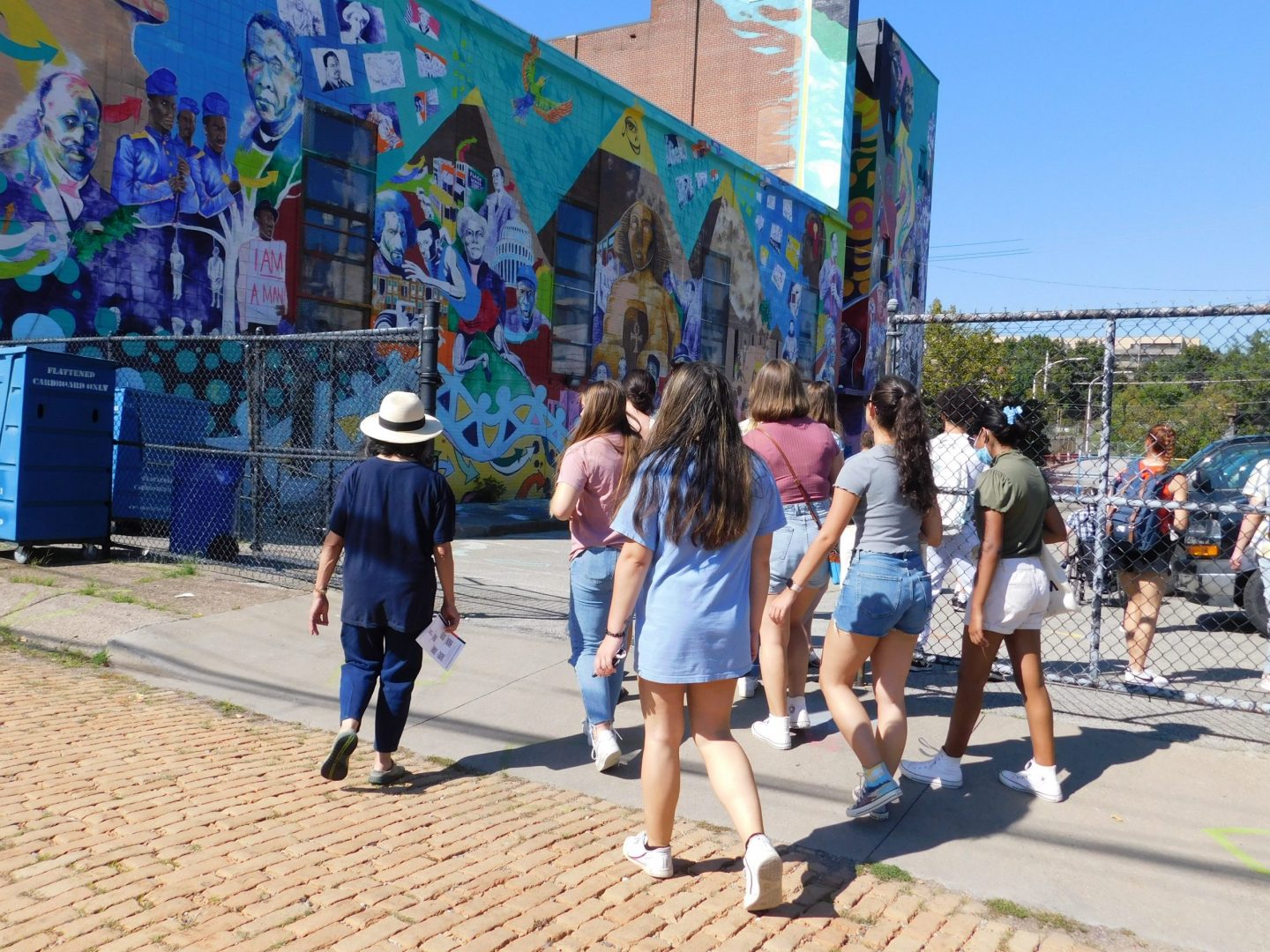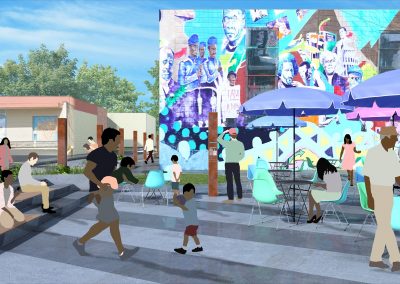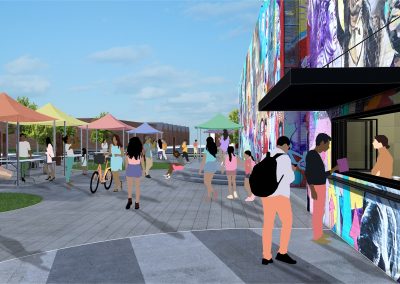revitalizing neighborhoods
Advancing equitable and inclusive development activities in Black and Brown communities.
revitalizing neighborhoods
Advancing equitable and inclusive development activities in Black and Brown communities.

Dollars Leveraged by Project Support

TA Hours Provided to Development Projects

Dollars Invested in Projects

Projects Sponsored by Minority-Led Entities
Supporting a community’s vision to turn a parking lot into a community gathering space | CEA Community Plaza
The Community Empowerment Association’s Community Plaza is being developed as a 10,000 s.f., publicly accessible space that celebrates African American history and culture, further beautifies the physical core of the neighborhood, and serves as a literal and figurative connection point for Homewood. The project highlights an existing mural, by artist Kyle Holbrook, on the side of CEA’s building that is a monument to and celebration of African American perseverance in the face of inequity. The Plaza will be a public space oriented to the mural that provides a flexible area for events and inspiring educational displays.
Homewood’s community vision is to be recognized as an African American cultural destination. The location of the plaza, in addition to being adjacent to CEA, will foster connections between leading Homewood institutions, including the Afro American Music Institute, the Homewood-Brushton YMCA, Miss Mary’s Community Garden, Oasis Community Kitchen, CCAC, and the Pitt Community Engagement Center. Each of these organizations lie one or two blocks away from CEA. In addition, rising real estate prices and gentrification in East Liberty is beginning to encroach on nearby East End neighborhoods. Establishing Homewood as a celebration of Black culture will ensure community ownership as the neighborhood potentially changes.
We are proud to partner with CEA on the development of this plaza. Our involvement with this project began with a $5,000 grant to pay for marketing assistance and throughout 2022, grew to include schematic design and storytelling services and direct fundraising support that has helped raise over $1.25M toward the Community Plaza.
Below are graphic images of the design plans for a new plaza at CEA. We pipelined this project to Equity Centered Designer, Dario McPhee, Associate at Indovina Associates Architects LLC, who rendered these while we provided storytelling and technical assistance to CEA during the planning process
- $5,000 Design Grant: Our Social Impact Design team provided approximately $5,000 of in-kind design and storytelling services to facilitate the conceptual design phase of the project. Once initial concepts were developed, we pipelined this project to Equity Centered Designer, Dario McPhee, Associate at Indovina Associates Architects LLC, who rendered graphics for CEA.
- $1,250,000 raised to directly support the plaza:
- $1,000,000 — Redevelopment Assistance Capital Program (RACP) Grant: We assisted with acquiring CEA a highly competitive state Redevelopment Assistance Capital Program (RACP) grant to make improvements to its building and the adjacent community plaza.
- $150,000 — PA Department for Community and Economic Development (DCED) Grant: CEA received a grant invitation to apply for specialized state funding but it required a very tight turnaround to complete and submit the application. Through this nuanced process, Neighborhood Allies was able to support CEA in applying to and successfully securing the grant!
- $100,000 — Neighborhood Initiatives Fund (NIF) Grant: Through the URA we assisted with acquiring funds for the actual site development of the plaza through the NIF program which prioritizes neighborhood-scale projects and programs to help unlock economic and placemaking potential and support vision-to-action community investment strategies that build an equitable Pittsburgh.
how we help revitalize neighborhoods
Centralized Real Estate Accelerator
The Centralized Real Estate Accelerator empowers early stage for-profit and nonprofit developers and property owners to achieve their vision by improving technical capacity, increasing financial readiness, and building professional networks. The Accelerator focuses on community-based organizations, resident developers, and small business owners with the goal of creating more opportunities for community ownership in Black and Brown neighborhoods, as well as a pipeline of investable projects. The overall goal of this program is to generate system-wide change in Pittsburgh’s community development field to create more equitable outcomes for communities and people of color.
Neighborhood Capital Fund
With an unprecedented $2 million grant from McAuley Ministries, our Neighborhood Capital Fund is supporting transformative real estate projects in the Greater Hill District through patient, flexible capital that encourages prudent risk-taking and promotes equitable outcomes for businesses and residents. Through this fund we provide grants for predevelopment costs including architectural fees, engineering fees, environmental studies, surveys, legal fees, etc. We also provide loan guarantees and other forms of credit enhancement as well as direct injections of project equity. This fund is our solution to address a major dysfunction in the community development system–the lack of wealth in the Black community that makes real estate ownership and development more difficult.
Public Art and Communities
The Public Art and Communities (PAC) program is a partnership between Neighborhood Allies, the Office of Public Art, and the Borough of Millvale that supports the development of place-based strategies and temporary artworks that are responding to both the COVID-19 pandemic and its intersection with other critical public health issues. PAC engages artists to collaborate with communities to address their needs through public art and creative placemaking practices aimed to reenergize and reshape how residents imagine their neighborhoods.
Social Impact Design
Our Social Impact Design Program builds the capacity of both designers and the community by providing project management and schematic design support. This newly launched program works to increase the flow of public and private community development capital to low-income communities, building a network of equity-focused designers and community leaders, while elevating the voices of marginalized leaders in architecture and development, especially in our Black and Brown communities.
Get Online and Grow Online (GOGO)
The COVID-19 pandemic deeply challenged the future of our communities and economy. That’s why we launched a program in partnership with the Urban Redevelopment Authority, Get Online Grow Online to aid our local small businesses in implementing new, creative ways to reach their customers. Participants receive up to 10 hours of free technical assistance to help them enter the digital marketplace, receive personalized ecommerce solutions, refine their marketing and outreach, and network with the local business community.
Real Estate Co-Powerment Series
Co-created and launched in early 2017 by Neighborhood Allies and Omicelo Cares, the Co-Powerment Series is an education platform that demystifies the real estate development process, explains its associated terminology, and brings to light the productive role community members and organizations play in the real estate and economic development inside their neighborhoods. An overarching goal of the education series is to shrink the technical proficiency gap that exists between real estate developers and community leaders that are involved in local development projects.
Perservation Working Group
The Preservation Working Group is a dedicated network of policymakers, community stakeholders, and responsible nonprofit and for-profit owners and developers interested in the preservation of existing, privately-owned affordable housing over the long-term. The goals of the working group are to:
- Identify at-risk existing affordable housing through data analysis and the deep community and market knowledge of working group members;
- Advocate for local, state, and federal policies and programs that will increase affordable housing preservation in the Pittsburgh region, and for new and flexible capital sources; and
- Activate opportunities for preservation by attracting responsible, qualified buyers, positioning properties for acquisition and recapitalization, and connecting developers to capital and other resources.






